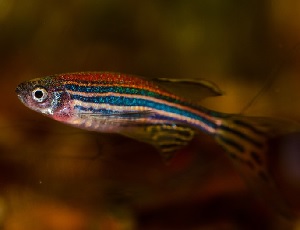
A team of researchers from the Institute of Environmental Sciences at the Jagiellonian University Faculty of Biology has developed a method of the Lecane rotifer culture, which can be used a an alternative way of producing feed for juvenile fish. Those fed with the novel high quality food were characterised by a considerably higher survival rate and viability.
Choosing the proper food is very important in the development of fry and fingerlings, that is, juvenile fish which are already capable of feeding themselves. These stages, together with the larval stage, are crucial for the future development of adult fish. Hence, it is very important to ensure that they are kept under proper conditions in this period of their lives. This obviously includes the choice of right food, which largely depends on the species and is much more difficult than in the case of mature fish.
The easiest solution for fish farmers is to use ready-made dry food, which according to most producers is nutritious and wholesome. Although its quality is often indeed very high, this does not ensure proper nutrition. A lot of young fish show little interest in dry and immobile food. Besides, giving inanimate food to predator fish species can lead do developmental disorders related to their changed behaviour. Finally, the digestive system of fry is still underdeveloped and the ingested food provides them with little nutrition.
There are numerous factors which make live food the most attractive source of nutrition. It is believed that the presence of living organisms in diet improves digestion thanks to the enzymes present in gastrointestinal tracts of the prey. Additionally, dry food often floats on water and tiny fish lack the strength to reach it.
Crustaceans of the Artemia genus are a popular live food option for fish. Yet, because of their relatively large size (at least 425 µm), they are not suitable for small fish fry. Besides, Artemia are a saltwater genus, which largely limits their use in freshwater aquacultures - putting them in freshwater reduces their activity to a point that they are no longer perceived as prey.
Another popular live food for fish are rotifers of the Brachionus genus. Research on how to optimise their culture has been carried out for the last 30 years, but the scientists still face many challenges in this area.
Zooplankton organisms, which are the most important type of food used to rear juvenile fish, are obtained from water bodies by aquarists themselves, which carries the risk of introducing unwanted microorganisms and pollutants to the aquarium. Besides, this sort of food cannot be kept for long.
Solution from the Jagiellonian University
A research team from the JU Institute of Environmental Sciences at the JU Faculty of Biology worked out a method of culturing rotifers of the Lecane genus. As these organisms live close to the bottom, they are more resilient to low dissolved oxygen levels and increased concentration of ammonium cations. The researchers managed to optimise the feeding of rotifers, which enables the production of a very large number of highly nutritious microorganisms in a short period of time. Thanks to the balanced diet, the rotifers are a wholesome live feed for juvenile fish. So far, they have been successfully tested on juvenile asps and zebrafish. When fed with this kind of live feed, they were characterised by increased survival rate and viability.
So far, the rotifers have also been successfully applied as a feed for tardigrades and as research material in toxicological, biomedical, evolutionary, and ecological studies.
The JU Centre for Technology Transfer CITTRU is looking for entities interested in using the Lecane rotifers as a feed for juvenile fish as well as other animals.




